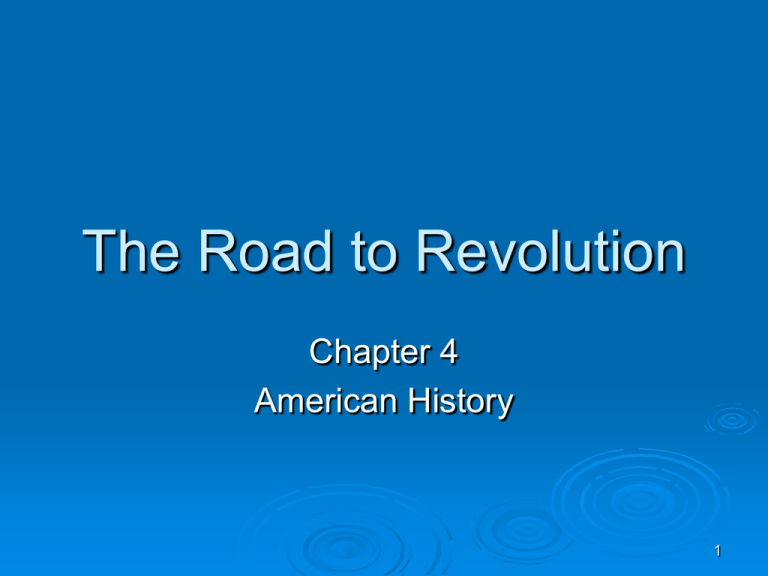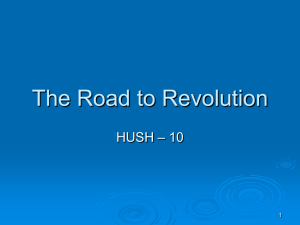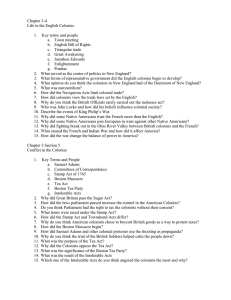Ch. 4: Road to Revolution PP Notes
advertisement

The Road to Revolution Chapter 4 American History 1 Economics in the Colonies Mercantilism: A nations power is in direct relation to the amount of money it has. Fixed amount of money in the world. You have to spend money to make money. Salutary Neglect: England left the colonies alone as long as they paid their taxes. Navigation Acts: Open vs. Closed vs. Black Markets. Exports vs. Imports 2 The French & Indian War 1754 - 1763 North American part of 7 Years War. George Washington in the Ohio Valley. Pyrrhic Victory for British War is one of the most expensive things any country has to pay for. How do countries pay for wars? British solution helps trigger American Revolution. The Colonists saw themselves as loyal British subjects. The English saw them solely as Colonists. 3 King George III Constitutional Monarchy. As King of England, he was in charge of all foreign affairs Parliament was in charge all domestic affairs. Monarchs aren’t used to not getting their way. He wanted to punish his insolent subjects. 4 Samuel Adams The chief instigator. A failure at almost every business he tried, including beer making. Orator and agitator. The red suit and grey wig. People were upset at the King’s taxes, Adams focus their anger into action. He was the founder of the Committees of Correspondence. He was the Boston leader of “The Son’s of Liberty”. They were ready to protest at a moments notice. 5 Colonial Complaints The Stamp Act: Everything printed was taxed and had to have a stamp on it to prove payment. The Tea Tax: Colonists were only allowed to buy tea from the British East India Company, at their prices. Alcohol & Tea vs. water in the Colonies? “No Taxation Without Representation” became the rallying cry of the Colonists. The Colonists did not have a seat in the House of Parliament in London, where the taxes were passed. Reality check: Subjects in England paid an average of 25% taxes, Colonists paid between 2-3%. 6 Taxes Poured Down Our Throats 7 Son’s of Liberty React Tar & Feathering 8 9 The Boston Massacre March 5th, 1770, tensions mounted after the death of 12 year old Christopher Snider. Several hundred protesters outside the Customs House in Boston. When the crowd started to become rowdy, the tax collector called for the help of local British Soldiers. The protesters started throwing snowballs at the soldiers and calling them names like lobster backs. The snowballs had pieces of brick packed inside of them. History is written by the winners, Truth vs. Myth. 10 How many people have to die for something to be a massacre? Who is writing the story? In this case 5 including a freed slave named Crispus Attucks. 11 What Happened? The troops were new arrivals from England and very inexperienced. It is generally agreed that one of the soldiers was hit by a snowball and knocked down. While falling, he fired his weapon. Witnesses reported hearing the command of “Fire”, but no one knows for sure if it came from the commander of the troops or the crowd. The Colonial Leaders, like Samuel Adams, took what actually happened and twisted it to get even more people angry at the British. 12 13 14 15 16 The Boston Tea Party In 1773, Samuel Adams was speaking before a group of roughly 8,000 followers. The Tea Act was the hot topic of the day. They decided that 3 British ships filled with tea leaves was a perfect target for their wrath. Shortly after the meeting, Mohawk Indians boarded the ships and dumped the cargo overboard. The Son’s of Liberty Symbolism vs. a disguise. In all, they dumped roughly 45 tons of tea, in 342 chests, into Boston Harbor that night. Why dump the tea vs. stealing it? Replacement locks and stolen tea. Roughly $1.7 Million dollars adjusted total value. 17 18 19 20 British Reaction was Swift England passes the Coercive / Intolerable Acts in response to Colonial activities. The Port of Boston was closed until the cost of the tea was repaid. More troops were sent to the Colonies to put down the “rowdy” Colonists. The torch had been lit. It became almost impossible for anyone to remain neutral. Everyone had to pick a side. Some began to see Independence as the only answer for the Colonist’s problems. 21 The Key Players John Adams Boston Lawyer John Hancock NY Businessman 22 The Key Players Patrick Henry Member of Virginia House of Burgesses Thomas Paine Author of Common Sense 23




